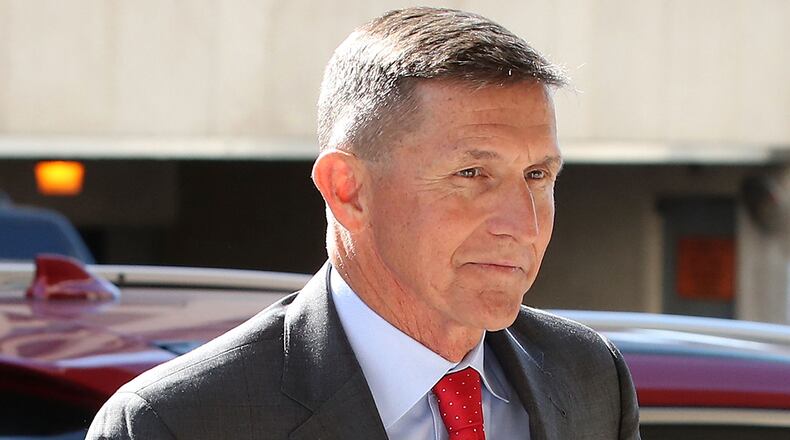A Florida judge on Tuesday found that former National Security Advisor Michael Flynn is a material witness and must testify before the Fulton County special purpose grand jury investigating former President Donald Trump and his allies for possible criminal meddling with the 2020 presidential election.
Sarasota County Circuit Judge Charles Roberts made his findings at the close of a 40-minute hearing in which Assistant Fulton District Attorney Will Wooten argued his office’s case remotely.
Flynn is now scheduled to appear before the special grand jury on Nov. 22, although his lawyer, Jason Greaves, said he will ask a Florida appellate court to stay the order to allow Flynn to appeal.
Because Flynn lives in Englewood, Fla., the hearing for his out-of-state summons was held at the Sarasota County courthouse. Flynn appeared at the hearing with his two attorneys.
Flynn, a former U.S. Army lieutenant general, served briefly as National Security Advisor under Trump in early 2017. But later that year, he pleaded guilty to making false statements to the FBI during Special Counsel Robert Mueller’s investigation into Russian interference in the 2016 election. In November 2020, Trump granted Flynn a full pardon.
Greaves argued that because the special grand jury is civil in nature, not criminal, Flynn did not have to honor the out-of-state summons. The attorney also said because the reasons given for Flynn’s testimony amounted to “innuendo, speculation and supposition,” Fulton prosecutors had not adequately shown why Flynn would be a material witness.
Wooten noted that Fulton Superior Court Judge Robert McBurney, in a prior order, had found the special purpose grand jury to be a criminal proceeding. Even so, Wooten said, Florida law only states that “a grand jury” — with no distinction as to whether it must be civil or criminal — has to be in operation for an out-of-state summons to be in play.
And there are several reasons why Flynn’s testimony is material, Wooten said, citing “circumstances related to his pardon.”
The prosecutor did not comment further on the pardon, except to note that in the weeks following it Flynn appeared on Newsmax and said Trump could invoke martial law and seize voting machines. Flynn also attended a White House meeting on Dec. 18 with Trump campaign officials and attorney Sidney Powell in which those same topics were discussed, Wooten said. Also proposed was appointing a special counsel to investigate possible election fraud, he said.
Greaves said he was “disturbed particularly by the innuendo” of Flynn’s pardon. As for martial law, the seizure of voting machines and the appointment of a special counsel, “none of that happened,” Greaves said. “It’s utterly irrelevant.”
But Wooten countered that because those topics were even discussed, “it’s highly relevant.”
Roberts said he found both Wooten’s arguments and McBurney’s ruling to be persuasive. And he denied Greaves request to stay his order to allow for an appeal, saying Flynn’s attorneys could ask a higher court for a stay if they wanted to.
“The witness is indeed material and necessary in the special purpose grand jury proceeding in the state of Georgia,” Roberts said.
Keep Reading
The Latest
Featured




